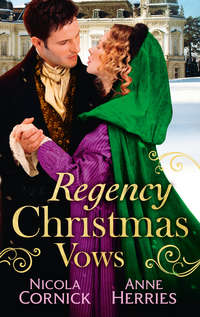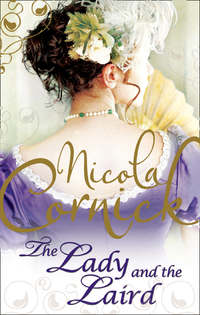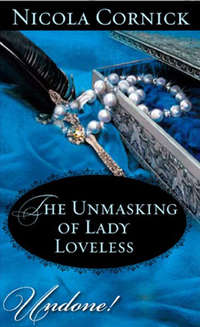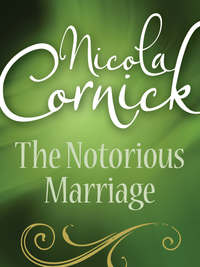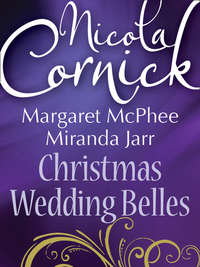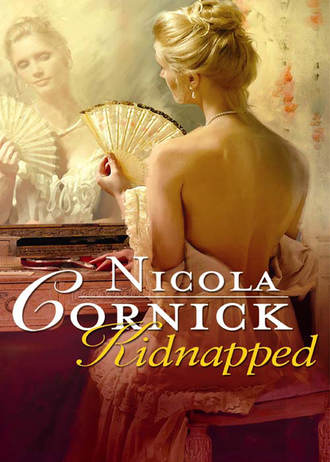
Полная версия
Kidnapped: His Innocent Mistress
Then Mr Campbell cleared his throat.
‘Which is nothing to the purpose, Catriona, since your papa, when he knew he was dying, wrote to his relatives at Glen Clair to ask that they offer you a home.’
Mr Sinclair shifted in his chair. ‘It is all arranged. I am here to escort you to Sheildaig on the morrow, Miss Balfour. Your uncle will send a carriage to collect you from the inn there.’
For the second time in the space of as many minutes I was silent with shock. How could Papa have arranged such a thing without telling me? Who was this uncle and his family of whom I had heard nothing until this moment, and why should they, who were strangers to me, wish to give me a home? Most importantly, how could it all be arranged when this was the first that I had heard of it?
I took a deep breath and, ignoring Mr Sinclair completely, addressed myself to the minister.
‘I beg your pardon, sir,’ I said carefully, ‘but you find me completely amazed. I did not know my father had any relatives in the world, let alone that they would be prepared to give me a home.’
Mr Campbell was now looking even more uncomfortable, and Mr Sinclair positively bored. He sighed, toying with the whisky in his glass, swirling it around and around. One lock of dark hair had fallen across his brow, giving him an even more rakish air. No doubt my amazement at the discovery of my long-lost family was of little consequence to him, and any attempt at explanation would be terribly tedious for him to endure. He had graciously offered to escort me—for what reason I was still unsure—and his attitude implied that it was my duty to be grateful for his condescension. I reflected that I was fast coming to find Mr Sinclair one of the most objectionable men of my limited acquaintance.
Mr Campbell rubbed his head, setting the sparse strands of hair awry. ‘Truth to tell, Catriona,’ he confided, ‘I scarcely know more myself. When your father was sick he gave me a certain letter and asked me to send it to Glen Clair. He said that it was to do with your inheritance. He asked that as soon as he was gone, the furniture disposed of and the house taken back by the charity trustees, I should send you to the Old House at Glen Clair and to your uncle, Ebeneezer Balfour.’ Here Mr Campbell looked hopefully at Mr Sinclair. ‘Perhaps you have something to add here, sir?’
Mr Sinclair shrugged his broad shoulders—carelessly, I thought. ‘I fear I cannot help you, sir,’ he said. ‘I am come to escort Miss Balfour as a favour to her uncle. That is all I know.’
I looked from one to the other. ‘My father never mentioned that he had a brother,’ I said. ‘All these years I never knew he had any family other than my mother and myself. I do not like to find such matters settled when I have had no say in them.’
Mr Sinclair looked at me. ‘You are familiar with the expression that beggars cannot be choosers, Miss Balfour?’
I glared at him. ‘Mr Sinclair, I do not believe you are contributing anything useful to this situation at all.’
‘Only a means of transport,’ Neil Sinclair agreed affably.
Mr Campbell settled his spectacles more firmly on his nose. ‘Family is always to be cherished,’ he murmured. ‘I know of the Balfours of Glen Clair, of course, but had no notion that your father was related. The Balfours were a great family once. Before the forty-five rebellion.’
‘You mean they were Jacobites?’ I asked, and for a moment it seemed that the very word caused the lamplight to grow dim and the shadows to flicker with secrets.
‘Aye.’ Mr Campbell looked grave. ‘They suffered reprisals for their loyalty.’
Mr Sinclair shifted, and I remembered that he was a Navy man in the service of King George III. The enemy was Napoleon and the French now, not the English, and the old days were long gone. Nevertheless, something in my Highland blood stirred at the old loyalties.
‘These days,’ Mr Sinclair said, ‘the Balfours are as poor as church mice, mistress. There will be no inheritance waiting for you at Glen Clair.’
I smarted that he might think me so shallow that all I cared for was a fortune—although if I were being completely honest a few hundred pounds would not have gone amiss. But I sat up a little straighter and said, ‘If I have found a family I did not know existed then that will be more than enough for me, Mr Sinclair.’
I thought the sentiment rather fine, and was annoyed that he smothered a grin in his whisky glass, as though to say that I was a foolish chit who knew nothing of what I was talking about.
‘We shall see,’ he said cryptically.
I stood up. I had had about enough of Mr Sinclair’s company for one evening. ‘If you will excuse me, sir?’ I said to Mr Campbell.
‘Of course,’ he murmured. His tired blue eyes sought mine and I realised then what an unlooked for responsibility I was to him. He had taken me in out of Christian kindness, love for me and friendship to my late father, but he and Mrs Campbell were getting old, and though they would never say it, they could not want the burden of a eighteen-year-old hoyden.
‘I will go and pack my bags,’ I said. ‘And I do thank you, sir, for I know that you always have my well-being at heart.’
It would take me little enough time to pack, in all conscience. I had barely a change of clothes and the few books that my father had left me.
Mr Campbell looked relieved. ‘Of course, child. I’ll bid you goodnight. I think,’ he added, and I wished there had not been such uncertainty in his tone, ‘that you are doing the right thing, Catriona. Mrs Campbell will accompany you as far as the inn at Sheildaig, under Mr Sinclair’s escort.’
Mr Sinclair said nothing at all, but there was a sardonic gleam in his dark eyes that I disliked intensely. He stood up politely as I left the room, and I felt his gaze on me, but I refused to look at him.
I went up the curving stair of the manse to the little room Mrs Campbell had given me on the first floor. My belongings, scattered untidily about the place, looked suddenly meagre and a little pathetic. This was all I had in the world, and soon I was to turn away from all things familiar and go to a family I did not know I had at a tumbledown house in Glen Clair. For a moment I felt a mixture of terror and loneliness, and then my common sense reasserted itself. Glen Clair was only two days away—which was fortunate, since I had no wish to be in company with Neil Sinclair any longer than I must—and I could always return to Applecross if matters did not work out for me. It was not the end of the world.
Nevertheless it felt close to the end of everything as I packed away my spare petticoat and my embroidered shawl, a few books and some sheet music, and the blue and white striped tooth mug that had been my father’s. I sat down rather abruptly on the narrow bed and had to take several deep breaths to calm myself when once again grief grabbed my throat and squeezed like a vice.
I slept badly that night, which was no great surprise, and in the morning awoke to find the house abuzz. A quick breakfast of milk and wheat cakes awaited me in the kitchen, and Mr Sinclair’s carriage was already at the door. I had barely time to snatch a mouthful of food and to hug Mr Campbell in thanks and farewell before it was time to go out to where Mr Sinclair awaited to escort me to my new life.
Chapter Three
In which I set out upon my journey to the house of Glen Clair, and Mr Sinclair behaves as no gentleman should.
It was uncomfortable being in an enclosed carriage with Mr Sinclair. The carriage itself was not uncomfortable, of course, being from the stables of the Earl of Strathconan himself. It had dark blue velvet seats with fat cushions, and was well sprung to protect us from the jolts and ruts of the road. No, it was only Mr Sinclair’s company that felt so unwelcome on that bright summer day.
I was acutely aware of his physical presence within the enclosed space. It felt as though he was too close to me in some mysterious way I had not experienced with anyone before. Strange, because he was sitting at a perfectly respectable distance from me, and Mrs Campbell was there as well, as the most irreproachable chaperon. Occasionally, when the coach would lurch over a particularly bad hole in the road, his leg would brush against mine and I would move the skirts of my second best gown away, much to his apparent amusement. On one occasion the carriage pitched so hard that I was almost unseated, and Mr Sinclair reached out to grab me before I tumbled onto the floor. His hands were hard on my upper arms as he caught me, and for a dizzy moment he was so close to me that I could smell the scent of his skin and the lime cologne he wore. My head spun in a very peculiar way. I know I turned very pink and I know that he observed it. He placed me back on the seat with absolute propriety, and then ruined it by giving me a look that was not remotely proper and made my blood burn. I knew that he was only doing it to disconcert me, and not because he had the least admiration for me, and this annoyed me all the more.
Mrs Campbell certainly did not seem to share my dislike of Mr Sinclair. Indeed, as the journey progressed it seemed to me that Mr Sinclair’s company was the only thing that made the whole thing tolerable from her point of view, for she hated to travel and had never been further than Inverness in her life. The two of them chatted away easily, about the weather and the state of the roads and the journey time between Applecross and Glen Clair, whilst I sat in my corner and wondered how a man like Mr Sinclair could get away with charming the chaperons into thinking he was not remotely dangerous.
It was another beautiful day. As the carriage climbed the track out of the village I watched the turquoise sea tumbling on the rocks far below and the black silhouette of the Cuillins of Skye against the sun. The air was full of the scent of gorse and hot summer grass. Presently I realised that Neil Sinclair was addressing me and withdrew my attention from the scenery with reluctance.
‘I beg your pardon, sir?’
‘I was asking, Miss Balfour, whether you had travelled much in the past?’
‘I have been to Edinburgh with my father on several occasions, sir,’ I said, ‘and I have sailed to Skye and the other islands more times than I can recall.’
‘And are you a good sailor?’
I saw Mrs Campbell nod a chaperon’s encouragement at this blameless conversation.
‘No, sir,’ I said. ‘I was sick in a bucket on all but one occasion, when the sea was as flat as a mirror.’
Mrs Campbell frowned.
‘Are you a good sailor, Mr Sinclair?’ I enquired. ‘One would hope so, since you are in the Royal Navy.’
Neil Sinclair smiled without mockery for the first time—a real smile that reached his eyes and made my heart jump, and almost made me forget that I disliked him.
‘No, Miss Balfour, I am not,’ he said. ‘I, too, was sick as a dog on my first few voyages, but unfortunately there was no bucket to hand.’
I smiled, too. ‘You said that you know my uncle, sir,’ I said, on impulse. ‘What manner of man is he?’
Mr Sinclair was silent for so long that I started to feel nervous. ‘Your uncle is a dour man,’ he said at last. ‘You’ll have little conversation out of him, mistress.’
That was not encouraging. ‘And my aunt?’ I asked, wondering if I wanted to know the answer.
‘Mrs Balfour suffers from her nerves,’ Mr Sinclair said.
I did not really understand such a complaint, having not a sensitive nerve in my body, or so I had been told. Lady Bennie, who suffered from nerves herself, mostly when Sir Compton spent time with his mistress in Inverness, had commented sourly on my lack of sensibility on more than one occasion.
‘Oh dear,’ I said. ‘And my cousin Ellen?’
Mr Sinclair smiled. ‘Miss Balfour is delightful,’ he said.
I felt an unexpected rush of jealousy and wished I had not asked.
The conversation waned. Mr Sinclair seemed disinclined to speak any further of my relatives, and I was sufficiently discouraged to think of my dour uncle and delicate aunt that I did not persist in my questioning. It did not sound as though a very warm welcome awaited me at Glen Clair, and I wondered once again why they had offered to take me in.
That night we stopped at the inn in Sheildaig, a building of whitewashed stone on the harbour. The bedchambers were clean and the linen fresh, if threadbare. I wanted to open the window, because the room felt stuffy and unaired, but when I pushed the creaking casement open the smell of gutted fish blew in and overwhelmed me. It takes a great deal to put me off my food—grief had certainly increased rather than diminished my appetite—but the rotten fish smell almost robbed me of any. I washed and went down to the parlour, where I took a little bread and cheese for supper and then retired for the evening. Mrs Campbell seemed relieved to see me go, for I think she was exhausted from a day’s travel on poor roads. Mr Sinclair got politely to his feet and came to the bottom of the stairs with me to light my candle, then wished me a goodnight.
A thunderstorm was brewing as I prepared for bed, the wind rising from the west battering the eaves and whistling through the cracks in the windowframe. When I was undressed to my shift and petticoats I did not immediately get into the bed, but sat on the window seat with my elbows on the sill. The stinking harbour was in darkness now, and the view was a deal more appealing than the smell had been. Half the sky was clouded over with the gathering storm, and the rain was sweeping in over the islands out to sea, but to the north the moon rode high on ragged clouds, attended by a scattering of stars and laying its silver path across the black waters. I stared, enchanted.
The noise from the taproom downstairs was growing now as the fishermen came in. I was tired from the jolting of the coach and my head ached. I took my tincture of lavender from my bag and rubbed my temples, breathing in the sweet, strong scent. Tomorrow a carriage would come to meet me and take me to Glen Clair and my father’s family. Mrs Campbell would return to Applecross on the drover’s cart. And Mr Sinclair…Well, from the conversation I had overheard between him and Mrs Campbell earlier, I understood that he was posted to a naval station some way up the coast at Lochinver, but since the signing of the Treaty of Amiens the previous month he had been granted some leave.
I wondered idly where he would be spending it, and with whom. Perhaps he would choose to spend the time with his family at Strathconan? Or perhaps he might go to Edinburgh to enjoy the entertainments of the city? Inexperienced as I was, I did not for a minute doubt that Neil Sinclair lacked for female companionship when he had the opportunity.
There was the scrape of a step in the inn doorway beneath my window. The lantern swung in the rising wind. A movement caught my eye and I looked down. Neil Sinclair himself was in the street directly below my window. He was looking up at me. And in that moment I realised what I must look like, with the candlelight from my chamber window no doubt turning the thin linen of my shift quite transparent and my unruly red hair loose about my face.
Neil Sinclair did not look away. He held my gaze for what seemed for ever, as the hot colour flamed to my face and my traitorous limbs turned to water. I could not move. Then he smiled, his teeth showing very white in his dark face, and raised a hand in deliberate greeting.
Suddenly freed from the captivity of his gaze, I stumbled back from the window and closed the shutters with such a sharp snap that I almost pulled them from their hinges. I realised I was shaking. Of all the foolish, immodest and downright dangerous things to do—leaning from my window like a wanton Juliet! I should have realised that someone might see me. I should have thought how abandoned I would look. But the trouble with me, as I already knew, was that I almost always acted first and thought later.
There was a knock at the door. Assuming that it was Mrs Campbell, come to help me with my laces, I went across and opened it.
Neil Sinclair stood there. I realised that he had come directly up to my chamber. Though I had been thinking of him only a moment before, I could not have been more shocked had it been Mrs Campbell herself running down the inn corridor in her shift.
Before I could prevent it, he stepped inside the room and closed the door.
I found my voice—and grabbed my gown to my chest to cover my near nakedness.
‘What do you think you are doing, sir? Leave this room at once!’
He smiled again, that lazy, intimate smile that had such a distressing effect on my equilibrium. I felt my legs tremble a little.
‘Do not be afraid, Miss Balfour,’ he said. ‘I merely wish to speak to you.’
‘This,’ I said, ‘is not the time nor the place to talk, sir. You are no gentleman to stand there staring at a lady in a state of undress!’
He gave me a comprehensively assessing glance that started on my heated face and ended with my bare feet, and he made no attempt whatsoever to disguise the fact that he was enjoying looking.
‘No gentleman, perhaps,’ he murmured, ‘but a man nonetheless.’
My hands clenched on my gown. I would have slapped his face to emphasise my point except that that would have necessitated dropping the garment and revealing even more of myself to his gaze. I was not exactly over-endowed with a bosom, but there was enough of it that I did not wish to expose it to him. Whilst I hesitated with this ridiculous dilemma of to slap or not to slap, he spoke again.
‘And I am beginning to think that you are no true lady, Miss Balfour.’
I froze, astounded. ‘I beg your pardon, Sir?’
‘No lady would see fit to undress and then lean from the window of a tavern in her shift, like the veriest wanton.’
I blushed hotly, the pink colour flooding not only my face but prickling the skin of my chest and shoulders as well. Having so pale a complexion can be such a curse.
‘That was a mistake!’ I said furiously. ‘I did not realise—’
His dark brows rose in quizzical amusement. ‘Indeed. You are wild, Miss Balfour, whether you realise it or not.’
We stared at one another, whilst the air between us seemed to sing and hum with something I did not understand. I was woefully inexperienced in the ways of men, but I could see desire darkening his eyes and I could feel an answering warmth in the pit of my stomach. I was shivering as though I had an ague, the goose pimples rising on my bare skin, but at the same time I felt hotter that I had ever felt before in my life. The fire hissed in the grate and the wind battered at the window, and I seemed sensitive to every sound and every sensation and most particularly to the turbulent heat in Neil Sinclair’s eyes.
‘You need not travel on to Glen Clair tomorrow,’ Neil said softly. ‘There is nothing for you there. Come with me to Edinburgh instead. You will have a house, with servants to attend you and fine clothes and jewellery. I would come to you often.’
I drew a deep breath. My heart was hammering. ‘Are you by any chance asking me to be your mistress, Mr Sinclair?’
No doubt the Miss Bennies would have collapsed with the vapours by now to be so treated, but even though I had no practical experience I was not a sheltered lady who did not know what went on between a man and a woman. Living in a small village one became aware of such matters. Besides, I was as blunt spoken as any man.
A disturbingly sensuous smile curled Neil Sinclair’s lips. ‘Would that be so very bad, Miss Balfour? I am offering you a comfortable home, instead of a ruin in the back of beyond with relatives who do not want you.’
‘You are not offering it for nothing!’ I snapped.
His smile deepened. He put out a hand and touched my cheek gently. I was so shocked at the physical contact that I jumped.
‘All I ask in return,’ he said, ‘is something that should be intensely pleasurable for both of us.’
Once again I felt that jolt deep inside me—the tug of desire that had me thinking all kinds of wanton thoughts. I swallowed hard and pushed away the heated images of lust and loving.
‘I thought,’ I said, ‘that you did not even like me very much.’
I saw something primitive and strong flare in his eyes, scorching me.
‘Then you know little of men, Miss Balfour,’ he said. His tone had roughened. ‘I wanted you from the first moment I saw you.’
‘Which was only yesterday,’ I said.
‘Sometimes it does not take very long to know.’
I spoke slowly. ‘You think me wild?’
His eyes were very dark. His hand fell to my bare shoulder, his touch light as feathers brushing the skin, and I shivered all the harder. He traced a line down my arm from the hollow of my collarbone to the sensitive skin of my wrist where the pulse hammered hard.
‘You are as fierce as a Highland cat, and with me you could always be as wild as your nature leads you to be.’
His words, so softly spoken and so intimate—so perilously tempting—made my stomach clench tight. But even so I knew that I had to stop this. Already, in my naivety and accursed curiosity, I had let it go on far too long. I should have thrown him out of my chamber within a minute, instead of allowing myself to be drawn in. The difficulty, the danger, was that Neil Sinclair was right. I was wild. I always had been. He had had my measure from the start.
My wayward mind whispered that it would be exciting, deliciously enjoyable, to be Neil’s mistress. My knees threatened to give way completely at the mere thought of him seducing me. I realised with a shock that I wanted him as much as he wanted me.
But I was not stupid. I would not trade my good name to be a rich man’s mistress, with my body entirely at his disposal. I would not do it even for those mysterious and seductive pleasures he promised. Yes, I concede I was tempted. Very well, I was greatly tempted—to within an inch of accepting. But…
‘So,’ I said, ‘you know I am alone and unprotected. You know I am penniless and dependent on the charity of relatives you say have none. So you make your dishonourable offer. You are a scoundrel, Mr Sinclair.’
He took a step back. He looked rueful now, and a little chagrined. I knew that he had sensed the struggle in me and realised that this time my honour had won out.
‘I am sorry that you see it that way, madam,’ he said.
‘How else is there to see it?’ I demanded.
He shrugged. ‘If you put it like that—’
‘I do!’
He raised his hands in a gesture of reconciliation. ‘Very well. I apologise. I made a mistake.’ He gaze went to my whitened knuckles, still clasped tight about the gown at my breast. ‘Have no fear, Miss Balfour. I am not a man who would force a woman against her will.’ He laughed. ‘It has never been necessary.’
Well! The arrogance of the man!
‘Good,’ I said. ‘Because I am not a woman to shout for help and bring the whole inn down about our ears—but I will if I have to.’
He smiled, and for a moment I felt my all too precarious determination falter. ‘But you were tempted by my offer,’ he said. ‘Admit it, Catriona.’
‘I was not.’ I turned my face away to hide my betraying blush and he laughed.
‘Liar,’ he said softly.
My chin came up. ‘I like Edinburgh,’ I said. ‘I like the shops and the galleries and the exhibitions and the lectures. I would like to visit again. But not at the price you offer, Mr Sinclair. I am not for sale.’
‘You have more resolution than I gave you credit for,’ Neil said. The smile was in his eyes again, admiration mixed with regret. ‘I should have remembered that you are a Balfour of Glen Clair. They can be damnably obstinate.’ He sighed. ‘I do not suppose,’ he added, ‘that you trust me now.’ There was an odd tone in his voice, as though he sincerely regretted it.
‘If I do not it is your own fault,’ I said. I smiled a little, being unable to help myself. ‘I never did trust you, Mr Sinclair. Not really. I always suspected you were a dangerous scoundrel.’




